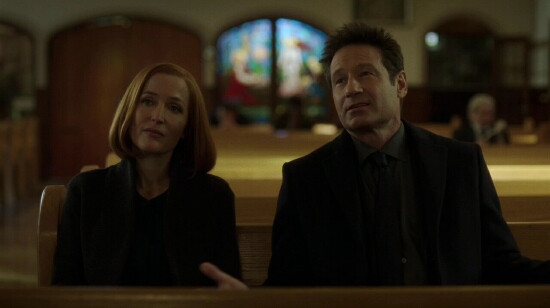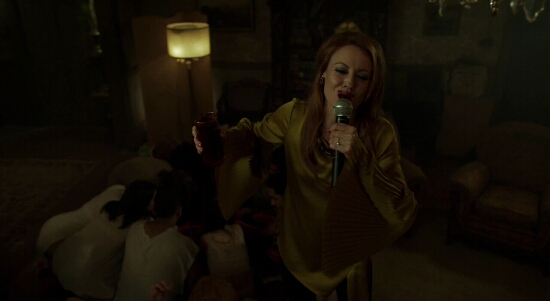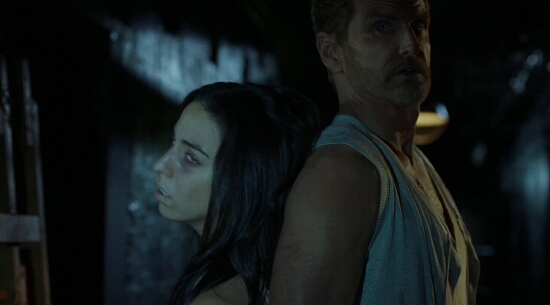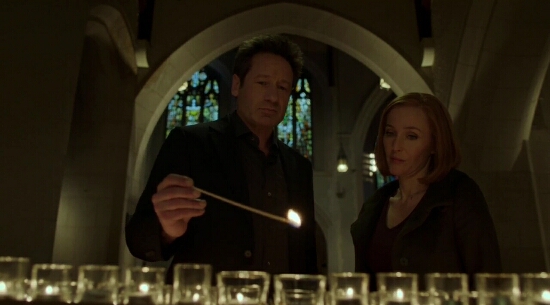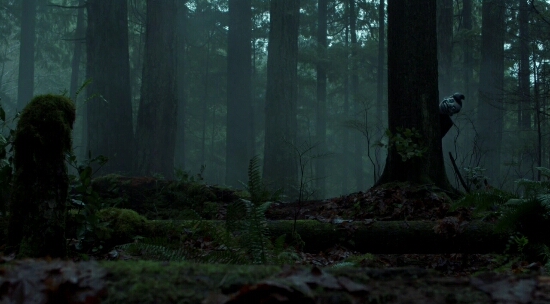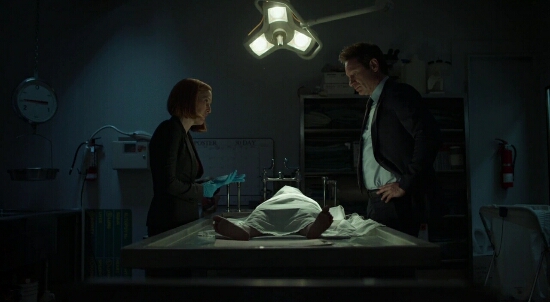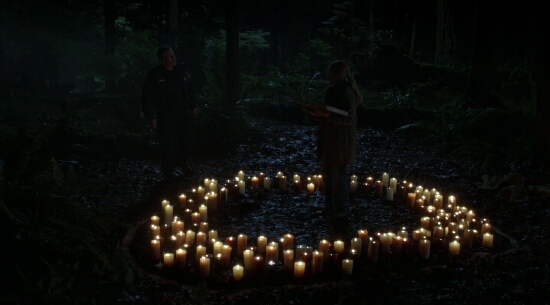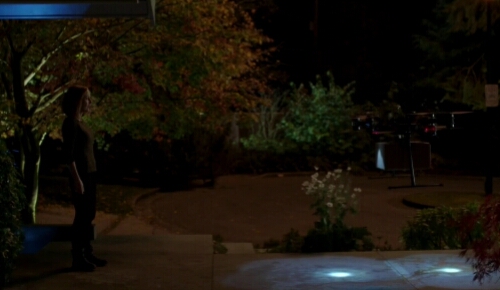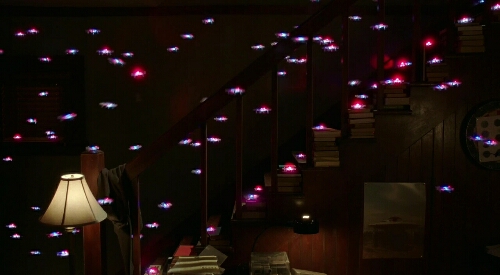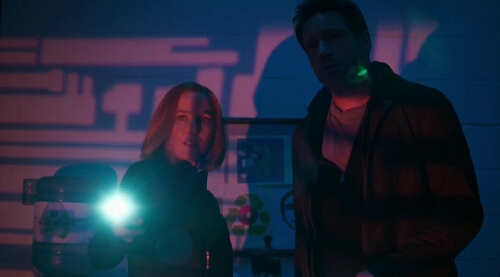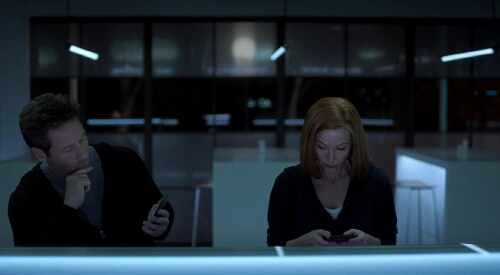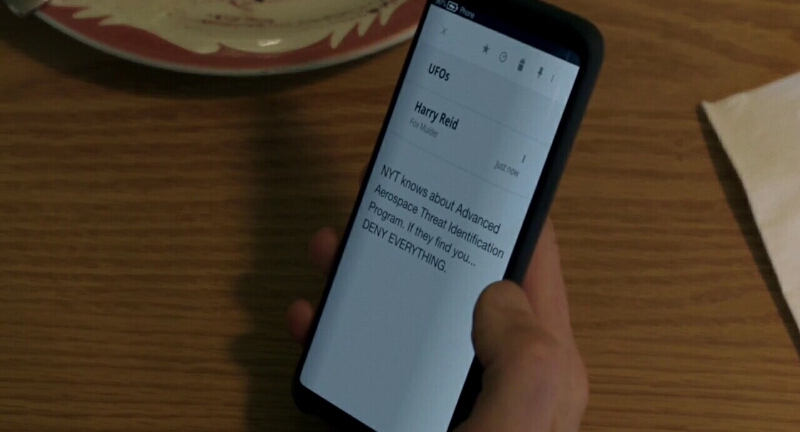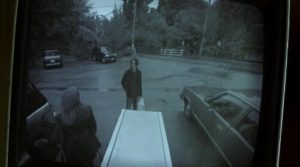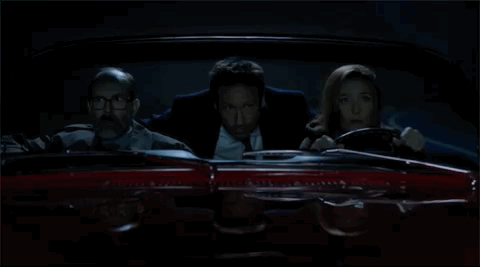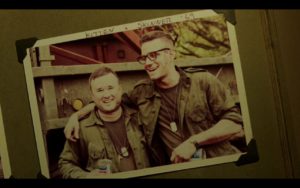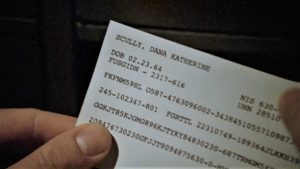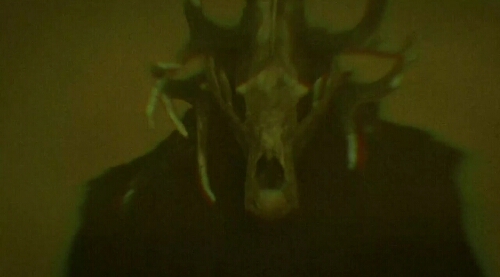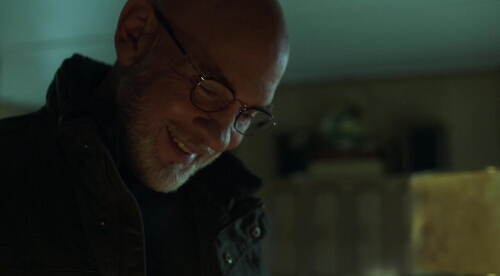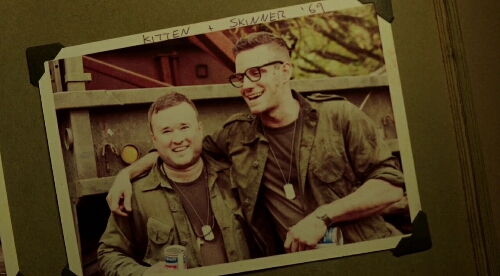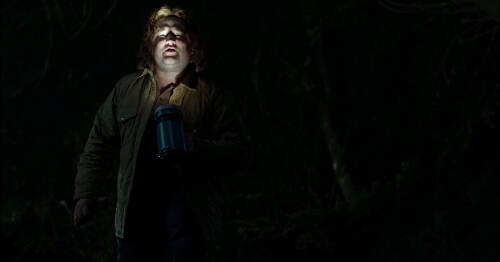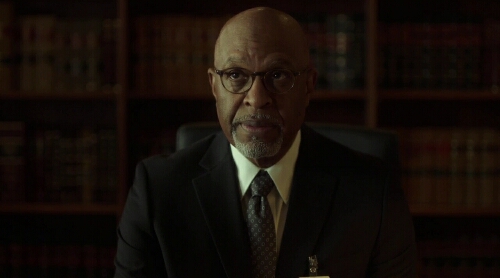The airing of 11X05: Ghouli was shortly preceded by the appearance of the website ghouli.net, which was also featured in the episode (and so its writing preceded the shooting of the episode). In an interesting move of 21st century viral marketing, this website is written in-universe as the blog of Jackson Van de Kamp, and offers information that was not presented in the episode.
ghouli.net went live on 25 January, with posts from William and others; the events of Ghouli happen at the same time it aired on 31 January; subsequent posts are user-submitted, i.e. any fan can post his or her story (and some of them could really pass for canon!). ghouli.net fills the double role of an in-universe creepypasta blog (fictional scary stories feeding an urban legend, in this case the Ghouli monster) and providing insight into William. The information here was certainly much more than could be discussed in a single episode, and Ghouli would have benefitted from being a double episode; some of it might be too much for even My Struggle IV to cover. Although “extended universe” information in multi-media platforms has become somewhat of a common practice in big franchises, it is a shame that the live show would not make more use out of this.
The William we discover in this blog is much more psychologically fleshed out and his experiences more detailed and interesting than the little we learn of him in Ghouli. Some of the character traits only roughly sketched out in Ghouli get more background here, in particular William’s troubled psychology. Some other traits that did not make him particularly likable in Ghouli, like him being a bad prankster and amateur pickup artist, are not referenced at all. Ghouli seemed to imply that William had an absolutely normal childhood, whereas here we see quite the contrary. All this would lead to believe that Chris Carter’s William in My Struggle IV and beyond will be somewhat different from James Wong’s William in Ghouli. On that topic, it is unknown who really wrote the content of this blog, possibly several people contributed; but given the close thematic resonance with the episodes, it is quite possible much of it is the work of Chris Carter and James Wong.
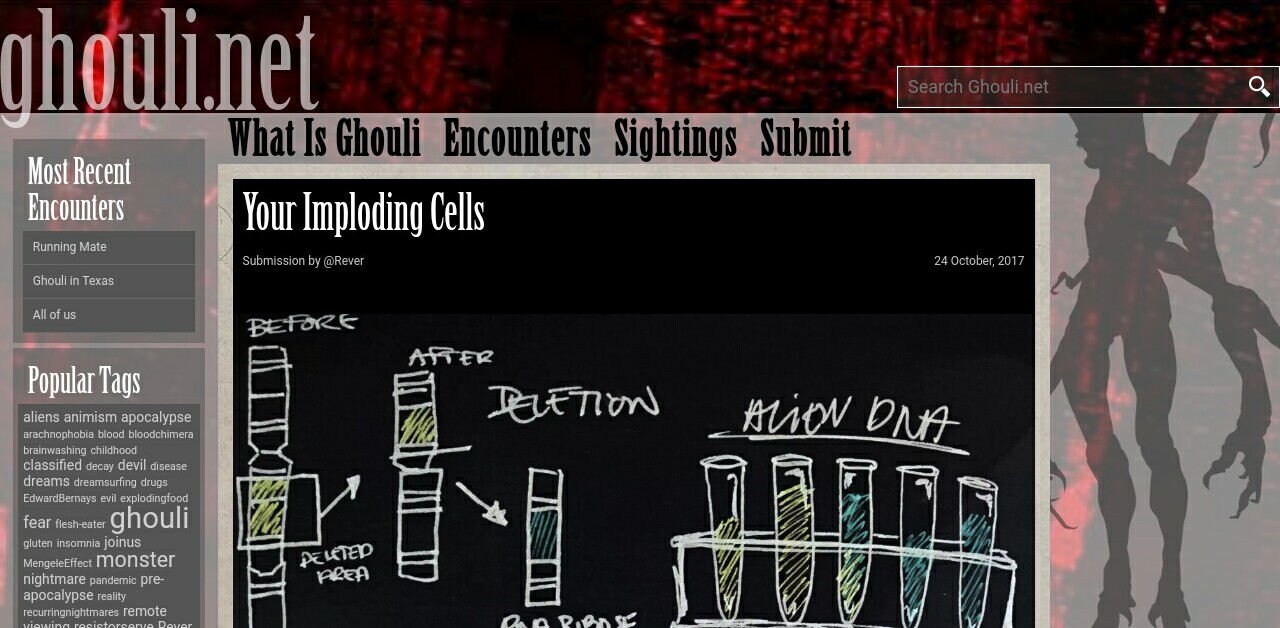
Let us go over the individual posts. William/Jackson is posting with the handle @Rever, which, apart from being a nice palindrome, also means “to dream” in French, which is relevant given the importance of dreams in William’s experiences. William posts either first person accounts or third person fictionalized accounts of what we suppose are true events, with himself as “The Boy”, “Billy” or “Sonny”, or even as Ghouli himself. The posts are dated from October 2017 to January 2018, however the events they describe are not presented in chronological order. @Rever’s posts can be roughly reordered in three groups, with non-Rever posts being relevant as well:
William’s young age
Crawling Empty Full
@Rever, 23 October 2017
William has been with his adoptive parents for five years, in rural Wyoming; his parents are considering moving around: “They lived in the middle of nowhere, by design. For now, anyway. […] She [mother] wasn’t sure how long they would stay in the Midwest.” This story is told with William as “The Boy”. On his sixth birthday, i.e. circa summer of 2007, William had a traumatic experience by being poisoned in the eye by tarantula hair. In his discussion with the tarantula, there are hints that William knows he is not quite human: the tarantula “looked like an alien from another planet” “Tarantula, what do you want to know from the People of Planet Earth?” “I do not think you are of this Planet. I think that you might be from mine.”
Your Imploding Cells
@Rever, 24 October 2017
Immediately follows. William had never been sick in his life before, appropriately superhuman. But with this incident his immune system collapsed. He was isolated in a quarantine room like a boy in the bubble, where he was monitored by scientists. Then: “He had been misdiagnosed. His immune system was more resilient than they had feared“, but the scientists were interested in him, taking stem cells from him, also fearing him. “They kept telling him that he was perfectly healthy. Maybe even healthier than he had ever been in his life.” His father visited at first, then no more; he remained under observation, trapped. He was exposed to a yellow gas from Project MK CHICKWIT, with no effect (this is reminiscent of MK NAOMI from Kitten; MK CHICKWIT was a real, post MK ULTRA, project over 1968-1971 that was collecting chemicals for experimentation on soldiers). He then exhibited telekinesis and mental powers, in scenes that are reminiscent of the children in Founder’s Mutation. Frustrated at being trapped, he escaped.
Does this experience mean that the tarantula poison somehow activated William’s Spartan virus, which destroyed his immune system? Following that, William’s alien biology would have kicked in and he reacquired his immune system. The exposure to the MK CHICKWIT gas was perhaps a way to test that immunity against the Spartan virus (Tad O’Malley mentioned the Spartan virus is activated via chemtrails, which could be this yellow gas). This incident is not referenced again, nor are William’s telekinetic powers; possibly the doctors “switched off” the genes resposible for some of his powers (with a magnetite injection like Jeffrey Spender’s in William?) and erased William’s memory of these events (like Mulder’s in Deep Throat).
This also means that William’s powers and location was known to “some” conspiracy since 2007. How to reconcile this with the fact that the CSM and the DOD are still searching for William in 2017/2018? So much has been made of the search for William that this contradiction cannot be ignored; but whichever solution adds enormous complexity that should be unnecessary at this point. All this could be an unreliable memory, or mixed with events that happened to another experiment child of Project Crossroads that William saw through remote viewing into the past, yet the tarantula incident is a blueprint for the later creation of the Ghouli monster. It could also be that these scientists were working for Dr. Matsumoto: as we learn in Ghouli, “Dr. Matsumoto burned all the files pertaining to the subjects to save their lives, and then he disappeared. The DoD has tried to track them down ever since.” After Matsumoto’s Project Crossroads was disbanded (circa 2002/2003), he could have found William somehow (psychic connection with the other gifted children he oversaw?), conducted these checks on him but did not share this with the rest of the conspiracy, and might still be keeping an eye on him from afar. The experiments in Founder’s Mutation with Dr. Goldman could be remnants of Project Crossroads, operated by Dr. Matsumoto.
You are the Living Key in a Dying Function
@Rever, 23 January 2018
William at 7 years old, i.e. circa 2008. He is “Billy Mullen” with his parents Janet and Steven, an “only child to two working parents” (Janet seems to be working in real estate). The setting is urban, the Van de Kamps have probably moved away from rural Wyoming after the tarantula incident. William has developed a sense of remote viewing and if not mind reading at least remote empathy — he is not clairvoyant, he cannot see future events. This only works with people or objects he has an emotional link to, he is only able to do it when he empathizes with people in distress οr sorrow or fear. The town psychologist tests his ability with a scientific method. During the test, with the key word “mother”, instead of searching for his “mom”, William searches for his biological “mother” — Scully, who at that moment was performing an autopsy in a morgue, and was thinking about the end of the world. William’s parents hadn’t yet told him he was adopted, and Janet fears his real biological mother might develop the same connection and come for him. This is the last entry on ghouli.net.
The visions posts
Time jump to a time much closer to My Struggle III and Ghouli.
Mobius Strip Tease
@Rever, 20 November 2017
William’s point of view of the dream Scully experiences at the beginning of Ghouli. Dream within a dream, feeling of being hunted by a shadow figure, doubling of self, fear of dying inside a dream, possibility this is premonition or memory: “As I stood there, about to flee again, someone else raced by me—it was me. Future Me? Past Me? No time to figure it out as he blew by, headed for the living room, undoubtedly. Good luck to him/me.” Of Scully: “She had red hair, wore a crucifix necklace, and had a look of deep concern. She seemed very familiar though.” She is not referred to as “Ginger” yet. This recurring dream is something William has had before Scully did, as per this post’s date months before the airing of Ghouli and Scully’s dream.
Dream Disease Apocalypse
@Rever, 22 December 2017
William’s visions of the impending viral apocalypse that is coming, clearly described as man-made: “The shadow powers are putting a plan in motion. They want to wipe out humanity to benefit themselves and start over with a clean slate.” He feels connected to the few that can change this: “Why I’ve been chosen as the conduit, I don’t know. But I know there are people in the world who can help, I see them in my visions, too. I just don’t know who they are. […] Their faces are foggy but they’re there, subliminally or just outside of my peripheral vision. The man with the eyebrows. The watching man. The blue eyed doctor. Others my age, possibly?” The first one is This Man (also in the posts’ tags; see the post “Radio Surfer” below); the second one could be Mulder, or again This Man, or even future William himself; the third is Scully; the others are possibly the Resistance (see the Knockout Mouse posts below). Could the date of this vision be significant? 22 December, exactly five years after the supposed alien colonization date in 2012.
In the Future We Shall Not Thrive
@Rever, 22 January 2018
Visions of the end of the world at the end of My Struggle II, the viral apocalypse and the majestic UFO appearing at the bridge. Scully is identified as “Ginger“. References to Tad O’Malley’s Truth Squad. The viral apocalypse is described both as man-made and alien. “Ginger was a beautiful sight in a sea of blights […] it was like a front row seat to seeing God appear from above in that final, transcendent moment before The End.”
This Screaming Skull
@Rever, 23 January 2018
An account of William’s seizures, which come with lights and an incomprehensible message, over which he does not seem to have any control (and resembles an alien abduction setup). As we saw in My Struggle III, these seizures come when he is bed, perhaps in his sleep as an evolution of his dreams. Visions of Scully as “Ginger“: “Blue eyes. Red hair. Of which I have neither. These are recessive genes.” William points out that he is physically and genetically different from Scully, but this observation would be out of place if he didn’t already suspect that he has a genetic connection with Ginger; hence he is already suspecting she is his biological mother. William knows he is sending messages to her: “When I seize, I transmit. I don’t know why or how. I don’t always know the message. But I know it’s important. And it’s important that she be the receiver. But transmission means pain for both.” William talks of injuries he has, perhaps as a result of his falling down or hitting himself when the visions come: “Do we bare the same scars? Slashed forehead and chin. Broken wrist and arm. Two or three concussions. I’ve fallen when there’s been no one to catch me.” He seems to go in and out of the hospital often because of this: “I’ll have to ask the next time I’m in the Emergency Room. They’ll think I’m weird. Weirder and weirder every time I go back. Inevitably, I go back.” Thus William must have had these seizures for a while, in a period of time longer than his connection with Scully, which only happened during the short length of My Struggle II/III. William cares for Scully but doesn’t seem to know who she is as a person: “Does she have someone to hold her hand, to break her fall? I hope she’s safe and cared for. She shouldn’t suffer more pain than I’ve endured myself. I want her to hear me, but I don’t want her to hurt, not because of my uncontrollable screaming skull.” William was thus sending these visions to Scully, but this was not some conscious choice; whoever or whatever is causing this, William does not know. This fits with Scully’s line in Ghouli about just being a receptacle. These visions could be a warning or a way to motivate these characters to do something about it, but we do not know who is causing this: “This Man”, aliens, God, future William reaching out in the past?
The Ghouli posts
Concurrent with the above; it is difficult to tell which come forst, the visions or Ghouli.
3H00. After Dark.
@Rever, 2 November 2017
William calls himself “Sonny”. In the suburban home with his adoptive parents, William has insomnia. The accompanying illustration from William’s diary includes a mention of a 4-feet tall black alien appearing at the foot of his bed. William wanders alone at night, street names clearly place this in Norfolk, Virginia, he passes through the gas station with the windmill from Ghouli. He is aware that he was given up for adoption when he was 10 months old, wonders “what’s wrong with Sonny“. He seems to be frequently monitored by doctors who study his unique biology: “Was his tetanus vaccine up to date? Maybe cutting himself with a rusty nail would prevent him from having to give blood again next week?” These could be not conspiracy doctors but just doctors doing checks on him with his frequent hospital visits following his seizures. What is causing his insomnia is “What he thought he may have overheard from the doctors. A single sample containing two separate blood types. Not biologically impossible, but extremely rare. Blood chimera. Abnormal.” William is a type of alien/human hybrid not seen before, as he seems to be carrying not one genome that is a mix but two genomes at the same time (somewhat similar to Mulder in the Biogenesis trilogy, but not due to the presence of Black Oil in his brain like Mulder, William carries this double genome from birth). The twin genome could point to William being a combination of natural birth (Scully and Mulder) and medical experiment (alien hybridization, as per My Struggle III using CSM’s genome?), thus William could have four biological parents; for the time being he has been in psychic contact with only one of them, Scully.
4H00. After Rust.
@Rever, 2 November 2017
Directly follows. William explores the Chimera boat; he used to hang around there with friends in the summer. He meets with Ghouli, a mix of insect and alien; cockroaches and spiders are referenced (the spider webs were also seen in the episode). Evidently Ghouli is a way for William to exteriorise his self-hate and incarnate the part of him that is alien, his “twin“, by making Ghouli look like a mix of human and spider (echoing his arachnophobia ever since that tarantula incident when he was 6). William knows he has been partly alien from his inception. William discusses with Ghouli: Ghouli: “We’re one and the same. I am you and you are me. I am inside of you. In your blood. […] I’m everything you hate, and feed upon your hate too.” Sonny: “I’m going to kill you.” Ghouli: “You already did. You absorbed me in utero. Face it, Sonny, you were a jerk before you were even born. If you’re not careful, you’ll kill everybody. Except for me. I could survive a catastrophic event. I could survive a goddamn nuclear winter.” This is all reminiscent of a long strain of episodes discussing the creation of a superhuman or supersoldier (Nisei/731, Nothing Important Happened Today) that could very well be a strategic weapon against the aliens themselves, and of the Black Oil emitting lethal radiation yet keeping the host intact (Piper Maru). There are hints that William has the power to kill everyone, and the power to survive the destruction he will unleash, reminiscent of the prophecised being that would have the fate of the world in its hands (The Sixth Extinction, Providence).
Encounter I
@Rever, 16 December 2017
Dream encounter of many flesh-eating Ghoulis in a primeval forest. William dies inside the dream (placing this after “Mobius Strip Tease“, where he still wonders about dying while inside a dream).
Knives Out (Encounter II)
@Rever, 19 December 2017
Dream encounter of Ghouli at William’s home. William is “J”, Ghouli takes the form of “B”, a girl he knows — presumably his girlfriend Brianna Stapleton. William is discovering that Ghouli — and by extension himself — can trick others into believing he is somebody else. Accompanying illustration could be storyboards for the teaser to the episode.
Mississippi Delta Waves
@Rever, 20 December 2017
A premonition that a Ghouli murder will take place on the Chimera boat. William talks about his collection of snow globes, especially the one with the Chimera boat. Inside that one, he witnessed a murder of a little man, and he was worried about his possible wife who would have to take care of their child alone. Since then the snow globe is deserted; he caught a glimpse of Ghouli there. William likes the calmness of the snowed landscape inside a snow globe; this could be significant with the reference to nuclear winter in the entry “4H00. After Rust.“: is William attracted by the idea of world destruction?
Melt, It Said.
@Rever, 22 January 2018
Ghouli — i.e. William — wakes up in an observation room, trapped and wired in scientific and medical equipment. Ghouli converses with the floor and the ceiling, about empathy and the inevitability of death. A UFO arrives. Ceiling: “You wish for the aliens to take everything man has built. You want the aliens to become hoarders. They will only take what is useful.” Ghouli: “I am of no use to them.” The UFO’s ray starts burning everything, including Ghouli. Is this a vision of a possible future fate for William? Or is William delirious during one of his hospital stays following his seizures? The fact that aliens are presented in a destructive light, but also in a destruction that might be liberating, might be significant for choices that William might have to make in the future.
The Knockout Mouse posts
Inserted between the posts are two that stand out, by K/OMouse. A knockout mouse is a lab test animal which has had a gene knocked out and replaced with an artificial one. These two posts have completely different date tags, New Year’s Eve and New Year’s Day 1970. This is possibly voluntary, to cover the tracks of whoever is sending these messages to William, who might have hacked his computer or blog to send these (1/1/1970 is date zero UTC in Unix computer systems). Knockout Mouse could be part of a group that is aware of Project Crossroads and other experiments aiming to create superhumans, perhaps a group formed by escaped children like the ones from Founder’s Mutation, looking to form an organized “Resistance” against the conspiracy.
the map Is not the territory
@K/OMoUsE, 31 December 1969
The title and the text relate to Magritte. The writer is teasing @Rever. It is pointed out that the handle @Rever is French “to dream”. A message endocded with Francis Bacon’s cipher reads:
“STUDY THE PAST IF YOU WOULD DIVINE THE FUTURE
PROJECT CROSSROADS IS PERTINENT TO YOUR HISTORY
THE REWARD OF TRUTH AND ENLIGHTENMENT AWAITS
DIG DEEPER AND YOU WILL BE LED TO THE DOCUMENTS”
Project Crossroads was the project William is the product of, as per Ghouli. This gets William on the way to discovering his nature by searching documents on Crossroads, which he has on his secret laptop in Ghouli.
the Resistance has landed
@K/OMoUsE, 1 January 1970
Echoing “The Eagle has landed“, Apollo 11’s first message when it safely touched the lunar surface in July 1969? This is a message to “The Boy”, encoded with a 3-letter shift:
“weseeyouwilliamvandekampweknowwhoyouare
andifweknowthentheyknowwhichyoushouldknow
crossroadswasonceanatombombandnowitisyou”
Operation Crossroads involved the testing of atom bombs in the Pacific Ocean in 1946, i.e. the development of a weapon (footage of these tests is in the teaser monologue of the CSM in My Struggle III). Project Crossroads, which produced William, also aimed at producing a weapon? Accompanying illustration has an alien face and an RNA nucleotide.
The rest of the non-Rever posts
Some relevant, some creepypasta and some whimsical posts.
THEM & THEY
@CameraBabushka, 25 October 2017
A trip into the conspiracies of The Lost Art of Forehead Sweat, as seen through the eyes of an elderly woman who discusses with Sarah Turner, one of William/Jackson’s girlfriends. Her mother and herself were experimented on by Dr E.B. “Bernie” Them and Dr. Thaddeus Q. They, whose ultimate conspiracy goal is to disseminate chemicals in food that aid the process of memory eradication and artificial memory implantation (first via Goop-A-B-C, and today via gluten-heavy foods). This woman was working as a secretary and translator for the government, and was working for the CIA in the 1970s, when the USA was trying to kill Fidel Castro with poisoned milkshakes. An amazing case of Mandela effect here: she mentions the movie “The Caligarian Candidate“, which is a misremembering of the conspiracy thriller involving mind manipulation “The Manchurian Candidate“, but it is also the title of one of Jose Chung’s previous books before he wrote From Outer Space! 1950s entertainer Dean Martin is also named…was this entry written by Darin Morgan?
Radio Surfer
@ThisMan, 30 October 2017
An odd associative account of sightings of This Man in dreams. The narrator remembers something from when he was five years old with his older brother. The narrator practices lucid dreaming and has many sightings of This Man, including some that correspond to the sightings in This and in Plus One (do the others correspond to upcoming episodes?). There are feelings that This Man travels from dream to dream through “The Signal” and that the narrator can find himself inside the dreams of others. There are mentions of a family watching television on a beach, which is an image in the teaser of My Struggle III. The narrator breaks the fourth wall when he describes what could be watching The X-Files and entering Scully’s dream: “This Man! He’s playing the neighbor in some old sitcom I’ve never seen before. Without hesitation, I run to the TV. I knock on the screen! I try to take his attention away from the woman he’s talking to! The sitcom plays on, ignoring me. I see him less and less and the woman more and more. Soon their scene together will be over. This is her show, she seems to dominate the scene. This is probably her own dream and I am intruding upon it.” This Man breaks the fourth wall himself when he reaches out to the narrator through the TV. Is this William’s account? Or the account of another person in a similar predicament as William, with which he feels connected (see “Dream Disease Apocalypse“). The accompanying illustration is from William/Jackson’s diary, with a portrait of This Man and scribbles like “Dreams are the royal road to the unconscious“, which is a Sigmund Freud quote.
The magic trick that was no trick
@RandyTheFake, 31 October 2017
A magician that would pretend to cut his assistant in two finds himself decapitated (by a katana sword like the ones in Plus One). He awakes in a secret facility, where his head and body are kept alive but separate; he learns to develop mental powers to control his body from a distance and is told that this is helping research for “the next step in human evolution”.
Here Be M_NST_RS
@CreepyBreezy, 16 November 2017
A Lovecraftian tale of two French anthropologists fatal encounter with a shape-shifting Ghouli in the Canadian wilderness, complete with disappearend Native American tribes, ancient runes, caves, skull shrines and murals.
[SPAMBOT] THESE MIND SUPPLEMENTS WORK!
@CaptainHarveyBrainBooster, 28 November 2017
Spam
How To Disappear Completely (Chapter 1 of 3)
@CreepyBreezy, 16 January 2018
Ghouli visits a family at dinner; nobody can see it, only the daughter momentarily senses it. Ghouli disappears in the mirror.
How To Disappear Completely (Chapter 2 of 3)
@CreepyBreezy, 21 January 2018
Continued. The daughter, Rikki Harper, has had her mobile phone destroyed and her dog killed by Ghouli; she keeps finding various small dead animals. She devises a plan to trap and kill Ghouli, with the help of a friend. Ghouli appears from a pool and is about to fall in the trap. There is no Chapter 3.
Summarizing what we learn
A tentative chronology of events in William’s life:
- Age 6, 2007: the tarantula incident, which results in him being experimented on, developing mental powers and telekinesis; a traumatic experience; his memory is either erased or he suppresses the memory because of the trauma, possibly both
- Age 7, 2008: developing a capability for remote viewing, first connection with “mother”/Scully
- Closer to 2017/2018: starts seeing This Man in dreams, feels that he can connect with others via dreams
- Has seizures with visions he cannot control, which result in him frequently visiting a hospital
- More and more specific dreams of the world ending, of a man-made viral disaster and aliens arriving; he connects with Scully by unwillingly sending her his visions, and senses that she is his biological mother (possibly this unlocks his childhood memories that he had compartmentalized or had had erased)
- Hospital doctors confirm there is something biologically peculiar about him (blood chimera: two genes expressed in a single body, hinting that William has more than two biological parents)
- William is contacted by a resistance group that could be constituted by a generation of children of William’s age that has some of the same mental powers as him, pointing him to Project Crossroads and result in him learning about his nature
- William creates Ghouli as a way to deal with his confusion, mixing in it his self-hate, his alien nature and his arachnophobia since his childhood trauma; he creates ghouli.net
- William has a morbid attractiveness to death and the apocalypse; he realizes he is both a weapon and a cure to whatever inevitable future is coming.
- Armed with that knowledge, after the events of the episode Ghouli, he takes off to travel the country in search of more information about himself, those who created him and those that send him messages or visions.
In essence, ghouli.net does what the series should be doing more of instead of focusing too narrowly on the old show formula: character development. William combines a story of a troubled teen with superpowers and a concentrated version of the seasons 1-6 mythology — the Black Oil/Spartan virus apocalypse-by-design along with Gibson/Cassandra/William, the perfect alien/human hybrid that would bring protection to the chosen few of the Syndicate/elites.
Hopefully the blog will be updated with @Rever’s thoughts, giving us insights in his story until My Struggle IV — until now it hasn’t been the case.
Thanks to Zerosum for many of the insights in this post!
